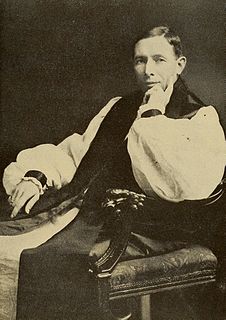A Quote by Gustave Flaubert
In my view, the novelist has no right to express his opinions on the things of this world. In creating, he must imitate God: do his job and then shut up.
Related Quotes
To be right, a person must do one of two things: either he must learn to have God in his work and hold fast to him there, or he must give up his work altogether. Since, however, we cannot live without activities that are both human and various, we must learn to keep God I everything we do, and whatever the job or place, keep on with him, letting nothing stand in our way.
For a spy novelist like me, the Edward J. Snowden story has everything. A man driven by ego and idealism - can anyone ever distinguish the two? - leaves his job and his beautiful girlfriend behind. He must tell the world the Panopticon has arrived. His masters vow to punish him, and he heads for Moscow in a desperate search for refuge.
If a man has the right to self-ownership, to the control of his life, then in the real world he must also have the right to sustain his life by grappling with and transforming resources; he must be able to own the ground and the resources on which he stands and which he must use. In short, to sustain his human right.
Just as in prayer it is not we who momentarily catch His attention, but He ours, so when we fail to hear His voice, it is not because He is not speaking so much as that we are not listening. We must recognize that all things are in God and that God is in all things, and we must learn to be very attentive, in order to bear God speaking in His ordinary tone without any special accent.
The things of the world are ever rising and falling, and in perpetual change; and this change must be according to the will of God, as He has bestowed upon man neither the wisdom nor the power to enable him to check it. The great lesson in these things is, that man must strengthen himself doubly at such times to fulfill his duty and to do what is right, and must seek his happiness and inward peace from objects which cannot be taken away from him.
The poet, as everyone knows, must strike his individual note sometime between the ages of fifteen and twenty-five. He may hold it a long time, or a short time, but it is then that he must strike it or never. School and college have been conducted with the almost express purpose of keeping him busy with something else till the danger of his ever creating anything is past.
We must never put our dreams of success as God's purpose for us; His purpose may be exactly the opposite. His purpose is that I depend on HIM and in HIS power NOW. His end is the process. It is the process, not the end, which is glorifying to God....His purpose is for this minute, not for something in the future. We have nothing to do with the 'afterwards' of obedience. If we have a further end in view, we do not pay sufficient attention to the immediate present; if we realize that obedience is the end, then each moment as it comes is precious.
A man should orient his will and all his works to God and having only God in view go forward unafraid, not thinking, am I right or am I wrong? One who worked out all the chances before starting his first fight would never fight at all. And if, going to someplace, we must think how to set the front foot down, we shall never get there. It is our duty to do the next thing: go straight on, that is the right way.
Men will imitate and admire his unmoved firmness, his inflexible conscience for the right; and yet his gentleness, as tender as a woman's, his moderation of spirit, which not all the heat of party could inflame, nor all the jars and disturbances of this country shake out of its place: I swear you to an emulation of his justice, his moderation, and his mercy.
If you do not take the distinction between good and bad very seriously, then it is easy to say that anything you find in this world is a part of God. But, of course, if you think some things really bad, and God really good, then you cannot talk like that. You must believe that God is separate from the world and that some of the things we see in it are contrary to His will.
In the job of a member of the Supreme Court of the United States, you're going to make decisions. You'll say things that some people are going to love them, some people are going to hate them. It's just part of the job. And so I respect the right of individuals to have strongly held opinions and to express those opinions in our country.






































